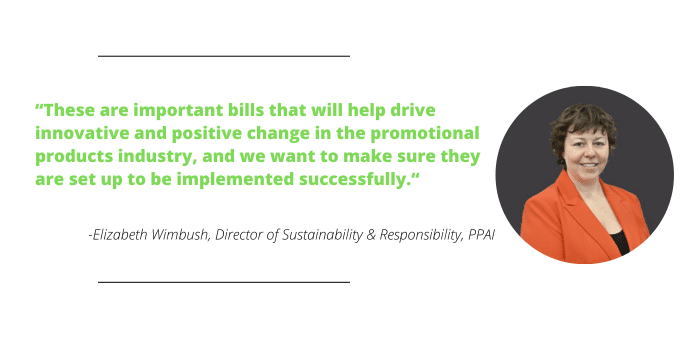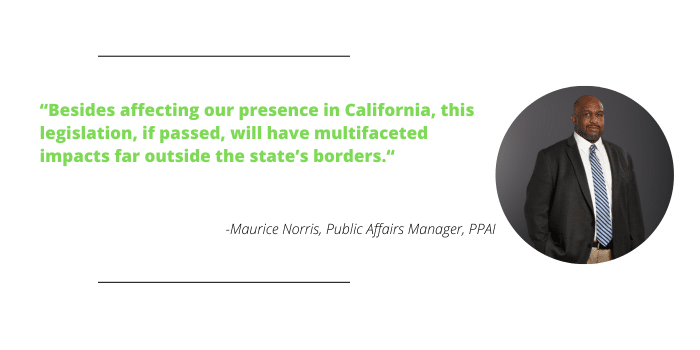Last week, PPAI joined the American Apparel & Footwear Association (AAFA) for a day of lobbying in Sacramento at the California legislature in order to educate and advocate on behalf of sustainability-focused polices.
The primary topics on PPAI’s agenda included:
- The Responsible Textile Recovery Act of 2023 (SB 707).
- PFAS regulation (AB 1817).
“These are important bills that will help drive innovative and positive change in the promotional products industry, and we want to make sure they are set up to be implemented successfully,” says Elizabeth Wimbush, PPAI’s director of sustainability & responsibility.

Joining Wimbush were Maurice Norris, PPAI’s public affairs manager, and Shannon Johnson, PPAI’s director of executive administration, plus representatives from:
- AAFA.
- The American Circular Textiles Group (ACT).
- Eastman, a chemical manufacturing company.
- Debrand, a provider of next-life logistics for apparel.
- The Apparel and Footwear International RSL Management Group (AFIRM).
Providing Perspective To Policymakers
Wimbush, Norris and Johnson took the opportunity to travel to California’s capital to lend the promotional product industry’s voice to the conversations around these two bills to ensure that PPAI members are represented and considered.
- The coalition met with nearly three dozen key members of California’s legislature.
PFAS, often referred to as “forever chemicals,” have been shown to put people at risk of adverse effects to their health. PPAI Magazine detailed what it referred to as “The Chemical Dilemma” and how the coming regulatory outcomes will impact promo. These chemicals can be present in the majority of promotional products, and PPAI wants to be at the forefront of assuring that the industry does not become associated with or perpetuate irresponsible practices.
AB 1817 states that, beginning January 1, 2025, “no person shall manufacture, distribute, sell or offer for sale in the state of California any new, not previously used textile articles that contain PFAS.”
The Responsible Textile Recover Act of 2023 (SB 707) is a California bill that would require producers to establish a stewardship program for the collection and recycling of textile products.
However, Norris says that this bill does not live up to what the industry hopes to see from such legislation.
“Purportedly a textile recycling proposal, SB 707 as it’s currently written falls short of achieving circularity due to the composition of the mandated Producer Responsibility Organization, the restrictive definition of recycling and other provisions,” Norris says. “Our industry also has unique concerns about some of the bill’s omissions, specifically the lack of take back programs.”
- The trip to Sacramento contributes to what will be ongoing education by PPAI to provide members clarity on both bills and guidance on how they impact supplier and distributor businesses.

According to Norris, SB 707 specifically, regarding textile recycling, will be something that PPAI will stay engaged with due to its industry relevance.
“Besides affecting our presence in California, this legislation, if passed, will have multifaceted impacts far outside the state’s borders,” Norris says. “PPAI staff will continue to track this bill and engage the state legislature where appropriate in hopes of making this legislation more effective at creating a circular economy.”


